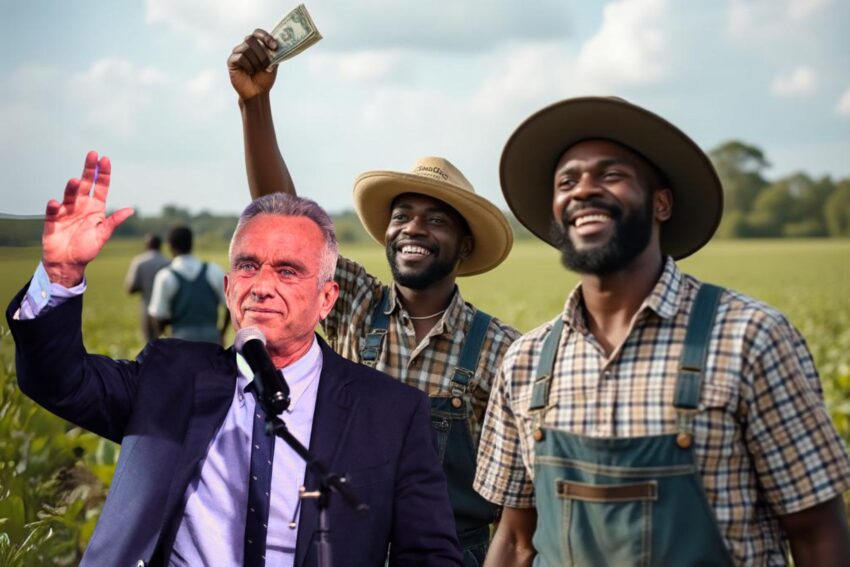Three months ago, Robert F. Kennedy Jr. was an independent presidential candidate making headlines for pledging $5 billion in reparations to Black farmers, aiming to address supposed discrimination within the U.S. agricultural sector. Black farmers constitute approximately 1.4% of the nation’s farmers, but they have been a big focus recently, with Vilsack’s USDA recently paying them $2.2 billion due to some non-White farmers being denied loans.
Kennedy claims that the $5 billion was “stolen” from Black farmers and they are entitled to it.
“That $5 billion is not money, that is an entitlement. It’s money that was a loan that Black farmers were entitled to way back when and was stolen from them through discrimination.”
RFK Jr. says he would give black farmers $5B in reparations — despite ruling that it’s unconstitutional https://t.co/iN1wtBETUg pic.twitter.com/8oqekHW9Hw
— New York Post (@nypost) May 20, 2024
However, recent developments have taken a dramatic turn. RFK Jr., once a vocal critic of establishment politics, has now aligned himself with Donald Trump’s campaign. This shift has not only surprised the Kennedy clan and many who followed his previous independent stance, but has also complicated the narrative around agricultural reparations and race-based aid.
The Trump campaign, with JD Vance as Trump’s running mate, has taken a starkly different approach to agricultural policy. Vance, known for his conservative views, has openly criticized the USDA’s initiatives aimed at providing relief based on race, arguing that such programs discriminate against White farmers. This stance directly contradicts RFK Jr.’s earlier promise, highlighting a significant policy divergence within the campaign.
Vance called the idea of race-based payouts disgraceful:
The Harris Administration, for example, handed out farm benefits to people based on skin color. I think that’s disgraceful. I don’t think we should say, you get farm benefits if you’re a Black farmer, you don’t get farm benefits if you’re a White farmer. All farmers, we want to thrive, and that’s certainly the President Trump and JD Vance view of the situation.
We reported on Vance’s comments here:
The debate over these policies has stirred considerable discussion on social media, where sentiments range from support for reparative justice to accusations of anti-White discrimination. Critics of the USDA’s race-based payments argue that such policies, while purportedly aiming to correct historical injustices, might create new forms of state-sanctioned racism. Supporters of reparations for Black farmers point to decades discrimination in the form of loan denials, which they say have significantly hampered the economic viability of Black farming communities.
RFK Jr.’s endorsement of Trump, despite their differing views on this issue, has left many in the agricultural community and beyond puzzled. Some speculate that this move might be strategic, aiming to unify a broader base of voters under the Trump banner, possibly at the expense of specific “left-wing” policy commitments, such as reparations for Black farmers.
The National Black Farmers Association had initially welcomed RFK Jr.’s reparations pledge, but has no desire to follow his endorsement of the Trump campaign. Leaders within the association have indicated that supporting the Trump-Vance ticket is “off the table,” especially after Vance’s remarks, which they describe as disrespectful to the struggles faced by Black farmers.
The National Black Farmers Association says supporting Trump is “off the table” after JD Vance attacked a program that helps Black farmers. Vance's remarks were “disgraceful, deplorable, dumb, degrading, and disrespectful to the nation’s Black farmers."https://t.co/Zvp0NTkkgj
— Keith Boykin (@keithboykin) August 16, 2024
This political maneuver by RFK Jr. underscores the complex interplay between policy, politics, and personal ambition. Politics makes strange bedfellows, as they say. It should come as no surprise that a politician would make a bold promise to one particular group for political brownie points and then shift allegiance to a camp that holds a diametrically opposed stance. However, perhaps this allegiance could end up shifting the stance of Vance more to the left. Only time will tell.
As the election approaches, the agricultural sector is watching closely. The outcome of this political chess game could significantly impact not just farming policies but also the broader discourse on ‘racial justice’ and economic reparations in America.


